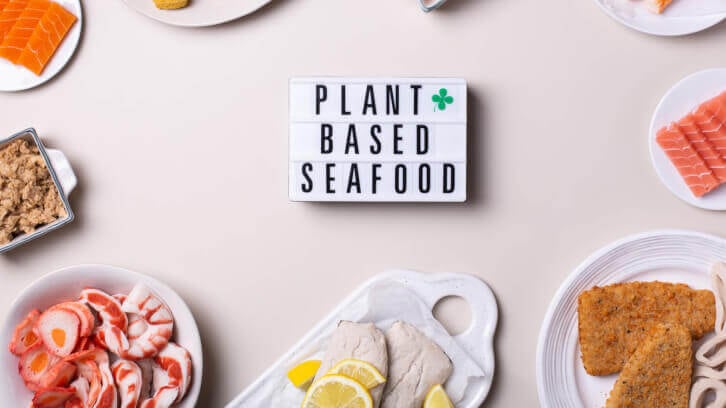Nosh.bio’s CEO recently told FoodNavigator-USA at Future Food-Tech in San Francisco that the company’s single-ingredient mycoprotein also offers solutions for many of the other challenges holding back consumer adoption of alternative proteins, including concerns about ultra-processing, taste, texture and nutrition.
“What we have developed is a completely new class of highly functional food ingredients that we are sourcing from a filamentous fungi,” which has a “pleasant taste with a pleasant texture” and the ability to “clean up” animal-free products thanks to its “natural animal meat-like texture” and functional properties that can replace stabilizers, emulsifiers and other select ingredients across categories, CEO Tim Fronzek said
He added the ingredient also addresses consumers’ nutritional concerns about plant-based alternatives because it is rich in protein and fiber and is cholesterol-free.
Thanks to the company’s proprietary production process, the ingredient can also be produced at a “very low cost rate” – making it “cost competitive with animal-based proteins,” he added.
[Editor’s note: Interested in learning more about the fast-evolving alternative protein space? Join FoodNavigator-USA and ReThink at Future Food-Tech Alternative Proteins in Chicago June 17-18. The event will include in-depth discussions about how to elevate sensory experience and strategies to diversify protein consumption with novel microbial and cell-based options. Check out the full agenda and register.]
Renovated brewery, partnerships with other brewers will boost production
Nosh.bio knew “from the very beginning” that managing costs and offering its alternative protein at a competitive price was essential to helping convince more households to use more animal-free products – which is why it created a “very lean” production process.
Fronzek explained Nosh.bio’s protein is produced via a natural liquid state biomass fermentation process and can digest different feedstocks, including low-cost ones upcycled from the food industry, which helps control input prices.
The company’s two-prong approach to manufacturing the ingredient also helps keep costs down and ensure sufficient supply.
Currently, the company is working with a contract manufacturer to produce about five tons per week with plans to scale up to 40 tons per week.
“In addition, we have … secured a shutdown [beer] brewery with a fermentation capacity of a half million liters, which provides us the opportunity to start producing probably from beginning of next year onwards in the range of 5,000 to 10,000 tons per year – which is a lot,” Fronzek said.
Noting that Nosh.bio’s first industry client expects to use the full amount the company can produce at its renovated brewery, Fronzek said the company plans to work with additional breweries to use their excess production capacity to further boost supply.
Through these partnerships, Fronzek said Nosh.bio can “scale much quicker than any other fermentation concepts.”
Versatility offers clean label solution across categories
Nosh.bio’s liquid state fermentation is similar to that used by others in the mycoprotein space, but unlike competitors, the fungi strain it uses can create “significantly” longer fibers and a neutral flavor profile that can be used for single-ingredient meat analogues and to replace animal ingredients across a range of products in different categories.
While Fronzek would not divulge the specific fungi strain, he said the long fibers mean the company need not use processes or additives typically required by other mycoprotein strains to recreate meat’s muscle-like texture, which simplifies processing and allows the company to create a single-ingredient meat analogue.
He added the mycoprotein has a “very slight umami taste” that is “very pleasant when it comes to meat analogues, but we can also wash the taste out” for a more neutral profile that better suits other applications.
These applications are diverse, based on the prototypes sampled at Future Food Tech in San Francisco, including its inclusion in a waffle, a thick savory sauce and two styles of traditional breakfast proteins.
Fronzek explained that Nosh.bio can dry and grind the protein into a flour that can be used in non-meat analogue applications, such as a replacement for chemical binders in baked goods, stabilizers in ice cream or even as a bulking agent in low-sugar chocolate.
First stop: German retail shelves followed by US stores
With its production strategy in place, Nosh.bio is poised to launch its first product in Germany within three to six months before expanding to the US in 2025. Because the company’s mycoprotein is not considered ‘novel’ in Europe, although it has not been used for this purpose, the company does not anticipate any regulatory challenge in Europe or in the US.



